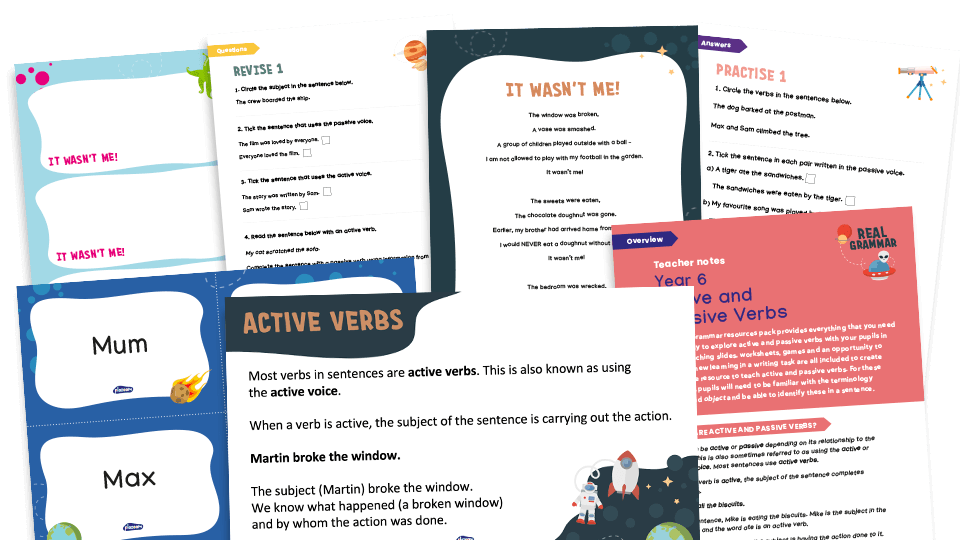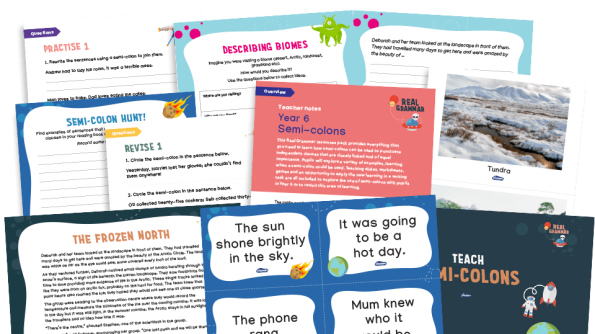6.2 Year 6: using passive verbs to affect the presentation of information in a sentence

Resource Collection
Real Grammar

Download your resource
Download nowThis resource is part of our grammar curriculum

- Covers every objective for years 1-6
- Five-step sequence ensures deep understanding
- Includes asssessment and revision tools
This Real Grammar KS2 resources pack provides everything that you need successfully to explore active and passive verbs with your pupils in Year 6. Teaching slides, worksheets, games and an opportunity to apply the new learning in a writing task are all included to create a complete resource to teach active and passive verbs. For these resources, pupils will need to be familiar with the terminology subject and object and be able to identify these in a sentence.
What are active and passive verbs?
A verb can be active or passive depending on its relationship to the subject. This is also sometimes referred to as using the active or passive voice. Most sentences use active verbs.
When the verb is active, the subject of the sentence completes the action.
- Mike ate all the biscuits.
In this sentence, Mike is eating the biscuits. Mike is the subject in the sentence and the word ate is an active verb.
When the verb is passive, the subject is having the action done to it. It is used to focus on what is happening rather than who is completing the action.
- The biscuits were eaten by Mike.
In this sentence, the focus is on what was eaten (the biscuits). The subject is the word biscuits and the words were eaten form a passive verb.
The subject and object in the active sentence have changed positions and the past tense form of the verb plus the verb form for ‘to be’ is used (were eaten).
The original subject in the active sentence becomes the object using the preposition by (by Mike). Sometimes this can be removed. (The biscuits were eaten.)
What is included in this resource pack?
This pack is divided into five parts:
TEACH
This section includes PowerPoint teaching slides and teaching notes with an optional script to introduce passive verbs. It can also be used to revisit this aspect of grammar with pupils.
PRACTISE
An independent activity for pupils to practise using what they have been taught, allowing teachers to assess understanding.
REVISIT
A series of short, 10-minute activities that can be used following the TEACH session to revisit and rehearse what has been taught. These may be short writing tasks, grammar games or editing/proofreading activities.
APPLY
A short writing task where pupils can use the grammar skills taught in context to produce independent writing.
REVISE
Five SATs style test questions, including cloze activities and multiple choice quiz questions, based on the grammar that has been taught.
Teachers can choose which section of the resource pack to use according to their pupils’ needs and could use the activities over a series of lessons or weeks
Teacher notes are provided to show how these quality resources could be used with pupils.
How is this resource differentiated?
The PRACTISE and REVISE sections include three activities differentiated for three levels of ability:
- Worksheet 1 for pupils who may need support. Questions will have a lower cognitive domain (what is being asked of pupils) and/or vocabulary used may be simplified where possible.
- Worksheet 2 for pupils working at age related expectations.
- Worksheet 3 for pupils who may need an additional challenge and may be working at a greater depth in this area. Questions will have a higher cognitive domain with more challenging vocabulary.
SUPPORT and CHALLENGE ideas are also included in the teacher notes of each section where relevant, with ideas of how to support pupils working towards the expected standard or at greater depth in this area.
What pupil-facing resources are included?
- TEACH
PPT slides; model text ‘It wasn’t me’
- PRACTISE
Practise 1, Practise 2 and Practise 3 worksheets
- REVISIT
Game 1, game 2
- APPLY
Planning sheet, writing scaffold
- REVISE
PPT slides; Revise 1, Revise 2 and Revise 3 worksheets
Answer sheets for all worksheets are provided, where appropriate.
This resource is part of the Real Grammar collection.
View more from this collection
Look inside!
Click through to see what this resource has to offer
More from this collection
Browse by Year Group
Year
1
Year
2
Year
3
Year
4
Year
5
Year
6
Upgrade now
Click 'Upgrade now' to activate your subscription. An invoice will appear on your accounts page and be sent by email. Once paid, the benefits of your full account will be unlocked within five days.











![Main image of 6.10 Year 6: T - layout devices [for example, headings, sub-headings, columns, bullets, or tables, to structure text]](https://www.plazoom.com/images/made/assets/resources/layout_resources_595_334_s_c1_c_t.png)